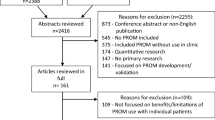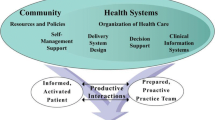Abstract
Objectives
To evaluate the association of diabetes treatment satisfaction and trust in family physicians with glycemic control among primary care patients with type 2 diabetes mellitus.
Methods
A cross-sectional study on 319 patients with type 2 diabetes mellitus from five primary healthcare centers in Egypt. Data were collected from February to August 2021 using a structured questionnaire that contained six parts: sociodemographic data, disease profile, the Diabetes Treatment Satisfaction Questionnaire (DTSQ), 8-item Morisky Medication Adherence Scale (MMAS-8), self-reported medication knowledge questionnaire (MKQ), and revised healthcare relationship trust scale (HCR). Multiple linear regression analysis was used to assess predictors of treatment satisfaction, physician trust, and HbA1c level. P values less than 0.05 were considered significant.
Results
The mean age was 59.66 years (± 7.87 years) and 55.17% were females. Multiple linear regression analysis for predicting HbA1c showed that HbA1c level was lower in patients with higher treatment satisfaction scores (β = − 0.289, p < 0.001) and higher medication adherence scores (β = − 0.198, p = 0.001). Treatment satisfaction scores were positively predicted by higher physician trust scores (β = 0.301, p < 0.001), increased medication adherence scores (β = 0.160, p = 0.002), and longer duration of diabetes (β = 0.226, p < 0.001). Positive predictors for physician trust included HbA1c level (β = 0.141, p = 0.012), medication knowledge (β = 0.280, p < 0.001), diabetes treatment satisfaction (β = 0.366, p < 0.001) and medication adherence (β = 0.146, p = 0.011).
Conclusion
Optimizing diabetes treatment satisfaction and physician trust could have favorable associations with medication adherence and medication knowledge with a possible improvement in glycemic control. Family physicians should incorporate patients reported outcomes alongside traditional clinical measures in evaluating diabetes management in primary care.
Similar content being viewed by others
Data availability
The datasets used and/or analyzed during the present study are available from the corresponding author on reasonable request.
Change history
27 August 2023
Underlines were included incorrectly in the table 1 and the values are corrected in this version.
References
WHO. Diabetes [Internet]. World Health Organization. World Health Organization; 2022 [cited 2023 Mar 5]. Available from: https://www.who.int/news-room/fact-sheets/detail/diabetes
Powers MA, Bardsley JK, Cypress M, Funnell MM, Harms D, Hess-Fischl A, et al. Diabetes self-management education and support in adults with type 2 diabetes: a consensus report of the American Diabetes Association, the Association of Diabetes Care & Education Specialists, the Academy of Nutrition and Dietetics, the American Academy of Family Physicians, the American Academy of PAs, the American Association of Nurse Practitioners, and the American Pharmacists Association. Diabetes Care. 2020;43(7):1636–49. https://doi.org/10.2337/dci20-0023.
Stellefson M, Dipnarine K, Stopka C. The chronic care model and diabetes management in US primary care settings: a systematic review. Prev Chronic Dis. 2013;10:E26. https://doi.org/10.5888/pcd10.120180.
Kim H, Shah K, Buettner C. Use of patient-reported outcomes for assessing diabetes outcomes. Endocrinol Metab Clin North Am. 2022;51(4):781–93. https://doi.org/10.1016/j.ecl.2022.05.001.
Hartman I. Insulin analogs: impact on treatment success, satisfaction, quality of life, and adherence. Clin Med Res. 2008;6(2):54–67. https://doi.org/10.3121/cmr.2008.793.
Rodbard HW, Peters AL, Slee A, Cao A, Traina SB, Alba M. The effect of canagliflozin, a sodium-glucose cotransporter 2 inhibitor, on glycemic end points assessed by continuous glucose monitoring and patient-reported outcomes among people with type 1 diabetes. Diabetes Care. 2017;40(2):171–80. https://doi.org/10.2337/dc16-1353.
Lind M, Jendle J, Torffvit O, Lager I. Glucagon-like peptide 1 (GLP-1) analogue combined with insulin reduces HbA1c and weight with low risk of hypoglycemia and high treatment satisfaction. Prim Care Diabetes. 2012;6(1):41–6. https://doi.org/10.1016/j.pcd.2011.09.002.
Marrero DG, Hilliard ME, Maahs DM, McAuliffe-Fogarty AH, Hunter CM. Using patient reported outcomes in diabetes research and practice: recommendations from a national workshop. Diabetes Res Clin Pract. 2019;153:23–9. https://doi.org/10.1016/j.diabres.2019.05.016.
Saisho Y. Use of diabetes treatment satisfaction questionnaire in diabetes care: importance of patient-reported outcomes. Int J Environ Res Public Health. 2018;15(5):947. https://doi.org/10.3390/ijerph15050947.
Muhammad Haskani NH, Goh HP, Wee DV, Hermansyah A, Goh KW, Ming LC. Medication knowledge and adherence in type 2 diabetes mellitus patients in Brunei Darussalam: a pioneer study in Brunei Darussalam. Int J Environ Res Public Health. 2022;19(12):7470. https://doi.org/10.3390/ijerph19127470.
Cani CG, Lopes LD, Queiroz M, Nery M. Improvement in medication adherence and self-management of diabetes with a clinical pharmacy program: a randomized controlled trial in patients with type 2 diabetes undergoing insulin therapy at a teaching hospital. Clinics. 2015;70(2):102–6. https://doi.org/10.6061/clinics/2015(02)06.
Negarandeh R, Mahmoodi H, Noktehdan H, Heshmat R, Shakibazadeh E. Teach back and pictorial image educational strategies on knowledge about diabetes and medication/dietary adherence among low health literate patients with type 2 diabetes. Prim Care Diabetes. 2013;7(2):111–8. https://doi.org/10.1016/j.pcd.2012.11.001.
AlRuthia Y, Almalag H, Sales I, Albassam AA, Alharbi FA, Almutairi AM, et al. The relationship between trust in primary care physicians and medication knowledge among diabetic patients. Res Social Adm Pharm. 2019;15(6):656–61. https://doi.org/10.1016/j.sapharm.2018.08.004.
Lee YY, Lin JL. The effects of trust in physician on self-efficacy, adherence and diabetes outcomes. Soc Sci Med. 2009;68(6):1060–8. https://doi.org/10.1016/j.socscimed.2008.12.033.
Dawson B, Trapp RG. Basic and clinical biostatistics. 4th ed. Philadelphia: McGraw-Hill Medical; 2004.
American Diabetes Association. Standards of medical care in diabetes—2020 abridged for primary care providers. Clin Diabetes. 2020;38(1):10–38. https://doi.org/10.2337/cd20-as01.
Bradley CL. The diabetes treatment satisfaction questionnaire: DTSQ. In: Handbook of psychology and diabetes: a guide to psychological measurement in diabetes research and practice. Chur, Switzerland: Harwood Academic Publishers 1994;pp. 111–132.
Wilbur K, Al Hammaq AO. Validation of an Arabic version of the diabetes treatment satisfaction questionnaire in Qatar. Diabetes Res Clin Pract. 2016;113:53–9. https://doi.org/10.1016/j.diabres.2015.12.005.
Bova C, Route PS, Fennie K, Ettinger W, Manchester GW, Weinstein B. Measuring patient–provider trust in a primary care population: refinement of the health care relationship trust scale. Res Nurs Health. 2012;35(4):397–408. https://doi.org/10.1002/nur.21484.
Morisky DE, Ang A, Krousel-Wood M, Ward HJ. Predictive validity of a medication adherence measure in an outpatient setting. J Clin Hypertens (Greenwich). 2008;10(5):348–54. https://doi.org/10.1111/j.1751-7176.2008.07572.x.
Ashur ST, Shamsuddin K, Shah SA, Bosseri S, Morisky DE. Reliability and known-group validity of the Arabic version of the 8-item Morisky Medication Adherence Scale among type 2 diabetes mellitus patients. East Mediterr Health J. 2015;21(10):722–8. https://doi.org/10.26719/2015.21.10.722.
Burge S, White D, Bajorek E, Bazaldua O, Trevino J, Albright T, et al. Correlates of medication knowledge and adherence: findings from the Residency Research Network of South Texas. Fam Med. 2005;37(10):712–8.
BMJ Publishing Group. Correlation and regression. http://www.bmj.com/about-bmj/resources-readers/publications/statistics-square-one/11-correlation-and-regression (2022). Accessed 5 Aug 2023.
DePablos-Velasco P, Salguero-Chaves E, Mata-Poyo J, DeRivas-Otero B, García-Sánchez R, Viguera-Ester P. Quality of life and satisfaction with treatment in subjects with type 2 diabetes: results in Spain of the PANORAMA study. Endocrinol Nutr. 2014;61(1):18–26. https://doi.org/10.1016/j.endonu.2013.05.005.
Bener A, Al-Hamaq AO, Yousafzai MT, Abdul-Ghani M. Relationship between patient satisfactions with diabetes care and treatment. Niger J Clin Pract. 2014;17(2):218–25. https://doi.org/10.4103/1119-3077.127562.
Redekop WK, Koopmanschap MA, Stolk RP, Rutten GE, Wolffenbuttel BH, Niessen LW. Health-related quality of life and treatment satisfaction in Dutch patients with type 2 diabetes. Diabetes Care. 2002;25(3):458–63. https://doi.org/10.2337/diacare.25.3.458.
Biderman A, Noff E, Harris SB, Friedman N, Levy A. Treatment satisfaction of diabetic patients: what are the contributing factors? Fam Pract. 2009;26(2):102–8. https://doi.org/10.1093/fampra/cmp007.
Saudi RA, Abbas RA, Nour-Eldein H, Sayed Ahmed HA. Illness perception, medication adherence and glycemic control among primary health-care patients with type 2 diabetes mellitus at Port Said City, Egypt. Diabetol Int. 2022;13(3):522–30. https://doi.org/10.1007/s13340-021-00567-6.
Iglay K, Cartier SE, Rosen VM, Zarotsky V, Rajpathak SN, Radican L, et al. Meta-analysis of studies examining medication adherence, persistence, and discontinuation of oral antihyperglycemic agents in type 2 diabetes. Curr Med Res Opin. 2015;31(7):1283–96. https://doi.org/10.1185/03007995.2015.1053048.
Baser O, Tangirala K, Wei W, Xie L. Real-world outcomes of initiating insulin glargine-based treatment versus premixed analog insulins among US patients with type 2 diabetes failing oral antidiabetic drugs. Clinicoecon Outcomes Res. 2013;5:497–505. https://doi.org/10.2147/CEOR.S49279.
Jaam M, Awaisu A, Ibrahim MI, Kheir N. A holistic conceptual framework model to describe medication adherence in and guide interventions in diabetes mellitus. Res Social Adm Pharm. 2018;14(4):391–7. https://doi.org/10.1016/j.sapharm.2017.05.003.
Halepian L, Saleh MB, Hallit S, Khabbaz LR. Adherence to insulin, emotional distress, and trust in physician among patients with diabetes: a cross-sectional study. Diabetes Ther. 2018;9(2):713–26. https://doi.org/10.1007/s13300-018-0389-1.
White RO, Osborn CY, Gebretsadik T, Kripalani S, Rothman RL. Health literacy, physician trust, and diabetes-related self-care activities in Hispanics with limited resources. J Health Care Poor Underserved. 2013;24(4):1756–68. https://doi.org/10.1353/hpu.2013.0177.
Hill-Briggs F, Adler NE, Berkowitz SA, Chin MH, Gary-Webb TL, Navas-Acien A, et al. Social determinants of health and diabetes: a scientific review. Diabetes Care. 2021;44(1):258–79. https://doi.org/10.2337/dci20-0053.
Acknowledgements
Deepest appreciation for the PHC patients with T2DM who participated in this study.
Funding
This research did not receive external funding.
Author information
Authors and Affiliations
Contributions
All authors contributed to the study’s conception, and design. NEA collected the data and HASA analyzed these data. The first draft of the manuscript was written by HASA and AIJ. HASA, NEA, and AIJ contributed equally to this work and share the first authorship. All authors commented on previous versions of the manuscript. All authors read and approved the final manuscript.
Corresponding author
Ethics declarations
Conflict of interest
The authors declare no conflict of interest.
Ethical approval
The study was approved by the Research Ethics Committee at the Faculty of Medicine, Suez Canal University, Ismailia, Egypt (Reference number 4099/2020, dated 17/2/2020). Informed consent was obtained from the participants before enrollment in the study.
Human rights statement
All procedures followed were in accordance with the ethical standards of the responsible committee on human experimentation (institutional and national) and the Helsinki Declaration of 1964 and later versions.
Informed consent
Informed consent was obtained from all patients for being included in the study.
Additional information
Publisher's Note
Springer Nature remains neutral with regard to jurisdictional claims in published maps and institutional affiliations.
About this article
Cite this article
Sayed Ahmed, H.A., Abdelsalam, N.E., Joudeh, A.I. et al. Association of treatment satisfaction and physician trust with glycemic control among primary care patients with type 2 diabetes in Egypt. Diabetol Int 15, 67–75 (2024). https://doi.org/10.1007/s13340-023-00653-x
Received:
Accepted:
Published:
Issue Date:
DOI: https://doi.org/10.1007/s13340-023-00653-x




